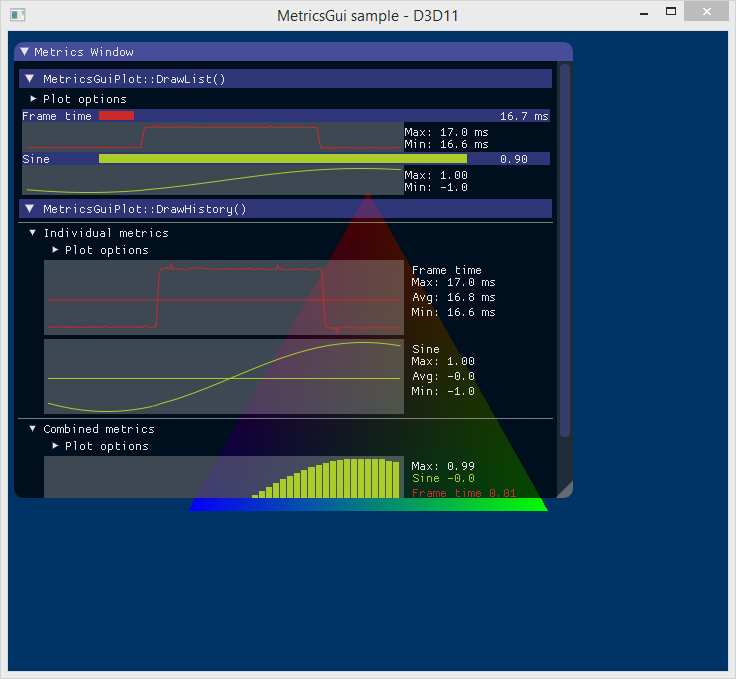This project will no longer be maintained by Intel. Intel has ceased development and contributions including, but not limited to, maintenance, bug fixes, new releases, or updates, to this project. Intel no longer accepts patches to this project.
This library provides ImGui controls for displaying performance metrics such as the following:
Copyright 2017 Intel Corporation
Permission is hereby granted, free of charge, to any person obtaining a copy of this software and associated documentation files (the "Software"), to deal in the Software without restriction, including without limitation the rights to use, copy, modify, merge, publish, distribute, sublicense, and/or sell copies of the Software, and to permit persons to whom the Software is furnished to do so, subject to the following conditions:
The above copyright notice and this permission notice shall be included in all copies or substantial portions of the Software.
THE SOFTWARE IS PROVIDED "AS IS", WITHOUT WARRANTY OF ANY KIND, EXPRESS OR IMPLIED, INCLUDING BUT NOT LIMITED TO THE WARRANTIES OF MERCHANTABILITY, FITNESS FOR A PARTICULAR PURPOSE AND NONINFRINGEMENT. IN NO EVENT SHALL THE AUTHORS OR COPYRIGHT HOLDERS BE LIABLE FOR ANY CLAIM, DAMAGES OR OTHER LIABILITY, WHETHER IN AN ACTION OF CONTRACT, TORT OR OTHERWISE, ARISING FROM, OUT OF OR IN CONNECTION WITH THE SOFTWARE OR THE USE OR OTHER DEALINGS IN THE SOFTWARE.
A simple example of MetricsGui usage can be found in the sample app in the 'sample/' directory.
Essential steps include:
- Allocate and initialize
MetricsGuiMetricinstances.
// Note: MetricsGuiPlot does not assume ownership over added metrics, so it
// is the users responsibility to manage the lifetime of MetricsGuiMetric
// instances.
MetricsGuiMetric frameTimeMetric("Frame time", "s", MetricsGuiMetric::USE_SI_UNIT_PREFIX);
frameTimeMetric.mSelected = true;- Allocate and initialize
MetricsGuiPlotinstances. The below shows all of theMetricsGuiPlotoptions with their default values (i.e., the same values set by theMetricsGuiPlotconstructor) so you only need to set ones you want changed.
MetricsGuiPlot frameTimePlot;
frameTimePlot.mBarRounding = 0.f; // amount of rounding on bars
frameTimePlot.mRangeDampening = 0.95f; // weight of historic range on axis range [0,1]
frameTimePlot.mInlinePlotRowCount = 2; // height of DrawList() inline plots, in text rows
frameTimePlot.mPlotRowCount = 5; // height of DrawHistory() plots, in text rows
frameTimePlot.mVBarMinWidth = 6; // min width of bar graph bar in pixels
frameTimePlot.mVBarGapWidth = 1; // width of bar graph inter-bar gap in pixels
frameTimePlot.mShowAverage = false; // draw horizontal line at series average
frameTimePlot.mShowInlineGraphs = false; // show history plot in DrawList()
frameTimePlot.mShowOnlyIfSelected = false; // draw show selected metrics
frameTimePlot.mShowLegendDesc = true; // show series description in legend
frameTimePlot.mShowLegendColor = true; // use series color in legend
frameTimePlot.mShowLegendUnits = true; // show units in legend values
frameTimePlot.mShowLegendAverage = false; // show series average in legend
frameTimePlot.mShowLegendMin = true; // show plot y-axis minimum in legend
frameTimePlot.mShowLegendMax = true; // show plot y-axis maximum in legend
frameTimePlot.mBarGraph = false; // use bars to draw history
frameTimePlot.mStacked = false; // stack series when drawing history
frameTimePlot.mSharedAxis = false; // use first series' axis range
frameTimePlot.mFilterHistory = true; // allow single plot point to represent more than on history value- Add metrics to the plot.
frameTimePlot.AddMetric(&frameTimeMetric);- Then, within your render loop you can add values to the metric history and update the plot axes.
frameTimeMetric.AddNewValue(1.f / ImGui::GetIO().Framerate);
frameTimePlot.UpdateAxes();- Render the GUI from within an ImGui window using either
MetricsGuiPlot::DrawList()orMetricsGuiPlot::DrawHistory().
frameTimePlot.DrawList();frameTimePlot.DrawHistory();

